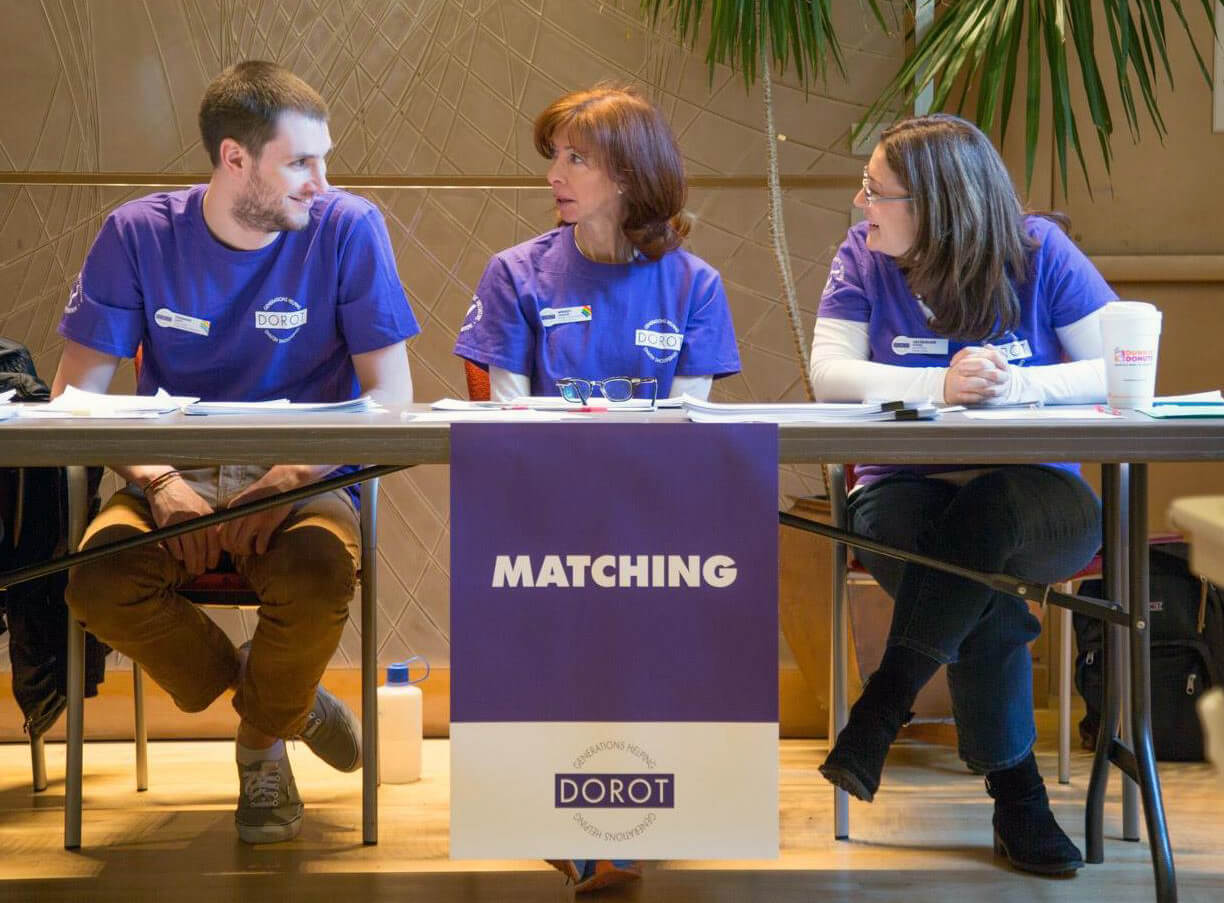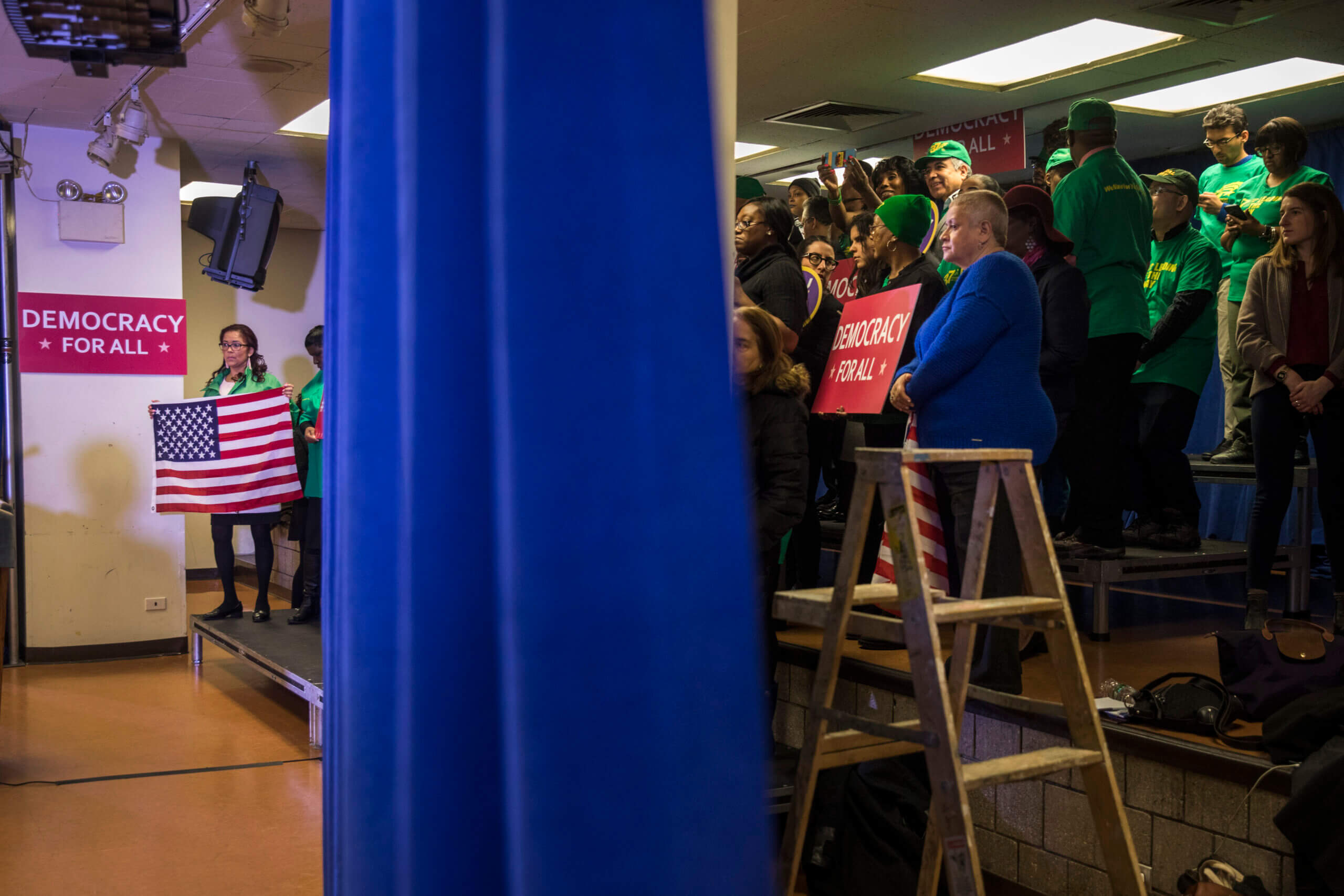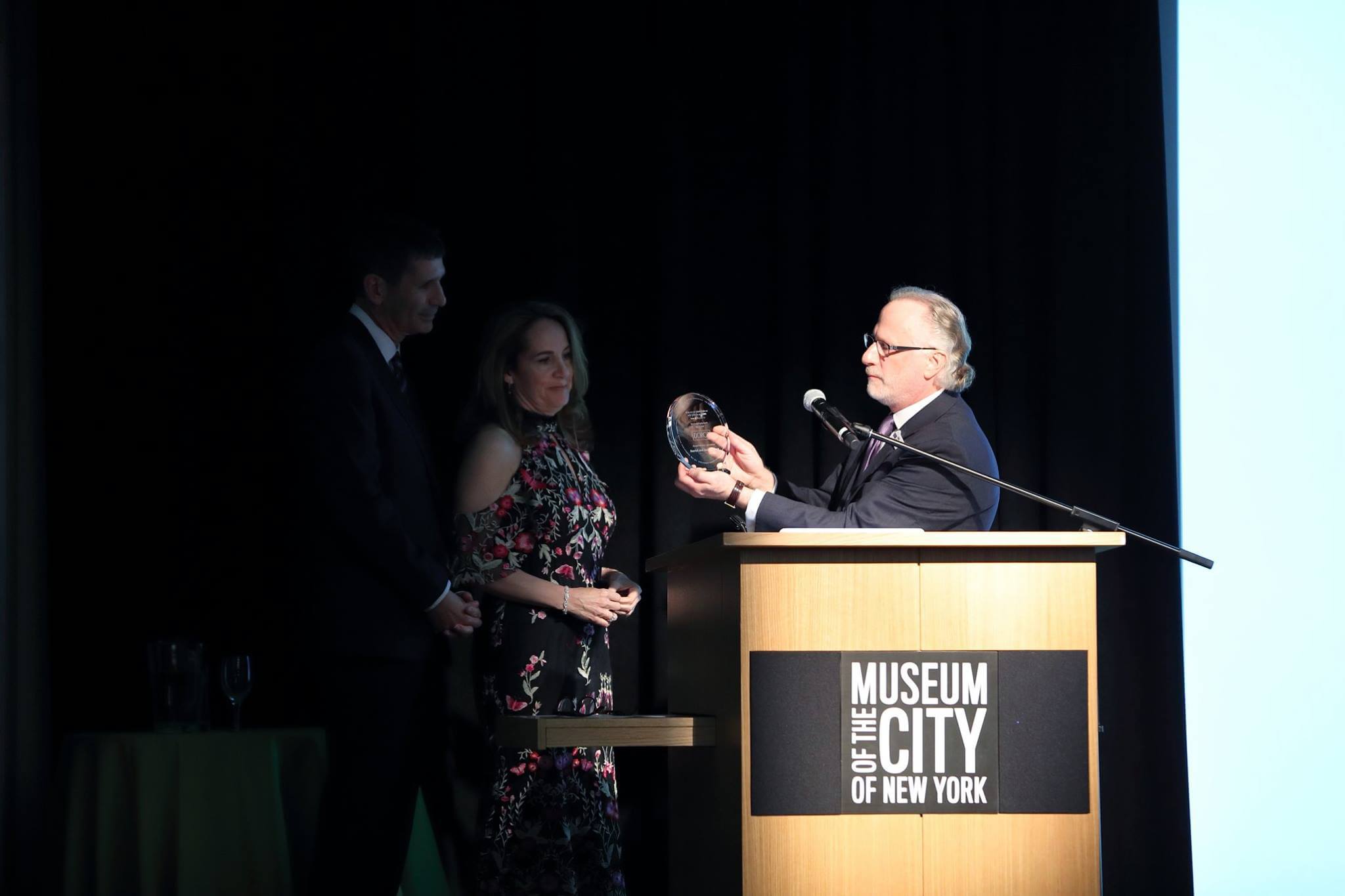Jewish seniors nonprofit Dorot rocked by budget cuts
The organization has increased expenses in recent years even as revenue has been uneven

Organizers of Dorot’s annual package delivery sit at a table during the 2016 event. The organization, which helps alleviate social isolation among older adults, is making budget cuts amid a financial deficit. Photo by Dorot
Dorot, a Jewish nonprofit based in New York City, has spent decades trying to alleviate loneliness among older adults, but the COVID-19 pandemic put its work into the spotlight. The organization was perfectly positioned to help seniors unable to leave their homes, and Dorot’s team of volunteers were featured on CNN and NPR, talking about its programs pairing seniors and millennial buddies, and classes to help the elderly write their memoirs.
They were also buoyed by an influx of cash earmarked for pandemic relief. Revenue more than doubled from $8.3 million in 2019 to $18.2 million in 2021. “Dorot has been extremely successful in our response to the coronavirus outbreak,” Mark Meridy, the group’s director, wrote in a 2021 report.
But Dorot’s funding steeply declined after the pandemic, and it’s now facing budget cuts and layoffs that could include roughly 10% of its workforce. Revenue was down nearly 70% in 2022, according to its most recent annual report, even as spending increased by more than 10%, although its financial picture improved last year as revenue spiked again and expenses fell.
Employees, who voted to unionize in December, said that management has asked some departments to cut their budgets by around 20% and announced tentative plans to fire eight workers and consolidate its two Manhattan offices. Dorot employs around 80 people and relies on 6,500 volunteers.
“People are stressed out, people are upset, and there’s not a lot of communication from management in terms of what else they’re going to do,” said Alaina Brodar, a program coordinator at Dorot.
Meridy declined an interview request but said in an email that “Dorot remains committed to its mission of addressing social isolation and loneliness” and that it had served more than 6,000 last year, nearly double the number it reached before the pandemic.
The organization provides a variety of services to older adults, including matching volunteers for weekly “friendly visiting” visits or phone calls, technology coaching, and cultural discussion groups hosted by museum curators and historians.
Workers say that Meridy has pointed to the Oct. 7 terrorist attack in Israel as one explanation for the organization’s financial challenges, suggesting that donors had shifted their giving to related causes.
But Andres Spokoiny, who runs the Jewish Funders Network, said that there had not been a “generalized decline” in philanthropy to Jewish causes unrelated to Israel: “Rather the opposite.”
“There’s fresh money going to major nonprofits,” Spokoiny said. “It could well be that smaller, non-established nonprofits are suffering, but I wouldn’t call it a trend.”
Union drive part of turmoil
Thirteen workers at Dorot announced plans to unionize last November, pointing to concerns over workload and pay disparities at the organization. Several of those involved in the effort said they have concerns about the organization’s financial priorities.
Dorot hired Proskauer Rose, a law firm that specializes in employment law and charges as much as $1,500 per hour for its services, to help management oppose the union drive.
Meridy sent the staff near-daily emails before the December election warning that “Dorot’s open culture is at risk.”
He wrote that the organization had been able to avoid layoffs in the past “because we had the flexibility of a non-union organization,” but warned that might “not be as easy with a union in place.”

Workers ultimately voted 21-14 to join District Council 37, one of the largest public employee unions in New York City, which also represents staff at the UJA-Federation of New York, Union for Reform Judaism, 92nd Street Y and several other Jewish nonprofits.
In his email to the Forward, Meridy said, “Dorot has and continues to fully respect the employees’ right to organize and hopes that we will have strong labor relations with DC37 as we move forward.”
Shortly after the union vote, Meridy announced to staff that the organization was facing a significant deficit and taking steps to cut costs. Employers are generally restricted from firing workers while negotiating an initial union contract with workers, but Dorot management has requested that the union allow it to lay off five union members and said it also plans to fire three managers.
Union members have also raised concerns about how much the organization is spending on executive compensation — Meridy and his four top deputies earn around $929,000 combined, roughly 8% of Dorot’s budget — and consultants, including $348,000 to a recruiting firm.
“We understand that budget issues are a reality for any organization,” the union said in a statement. “Our hope for Dorot is that our leaders will find ethical ways to reduce spending that do not prioritize executive and management positions over the workers that directly serve the community.”
Uneven revenue
Dorot, which means “generations” in Hebrew, was founded in 1976 by Jewish social workers on Manhattan’s Upper West Side who began visiting homebound seniors in the neighborhood. Like many historically Jewish human services agencies, the organization now serves people of all different backgrounds and describes itself as “a non-sectarian, culturally Jewish agency” that serves “the Jewish and wider community.”
It continues to run a kosher meal delivery service, maintains synagogue partnerships and receives funding from UJA-Federation of New York.
Meridy, who has led the organization for nearly 15 years, was recently named a “2024 nonprofit trailblazer” by City & State Magazine for his work expanding Dorot to provide online services to seniors in 37 states and three countries outside the U.S., in addition to New York and Westchester County.
Dorot’s expenses have nearly doubled over the past decade, and its staff has grown roughly 15%, according to the organization, as its revenue has fluctuated unevenly and it has eliminated some programs, including a transitional housing facility for elderly New Yorkers.
Some of the uneven revenue is the result of bequests received by Dorot after a donor dies, which can pump millions of dollars in additional revenue into the organization but only for a single year.

Meridy said that the board had previously used such donations to pay for regular expenses but has “determined the need to reduce the long-term reliance on these funds” due to their unpredictability. He added that the revenue spike in 2021 included a $5 million donation intended to establish an endowment.
Much of Dorot’s work relies on volunteers, and Brodar said staff had been encouraged to slow the onboarding process in order to reduce the amount Dorot had to spend on background checks.
Dorot’s leadership has “had to adapt our strategic initiatives and programming priorities in order to be responsible stewards of the organization, secure its long-term financial health, and ensure that Dorot can continue to provide the life-enhancing services that thousands of people in our community rely on,” Meridy said.
He also said that the organization decided not to renew the lease on an office that is adjacent to its main headquarters in Manhattan because most staff were working remotely for part of the week.
Frustration with management
But the sudden cost-cutting has been jarring for some staff. One employee, who spoke on the condition of anonymity due to fear of retaliation, said that when he was hired around three years ago Dorot offered him a higher salary than he’d requested and that leadership regularly emphasized its financial stability.
“In my head I was just like, ‘They’re super financially healthy, as long as I like the work I can just do this until I die,’” he said.
The employee said that until the recent revelations about Dorot’s budget deficit, his main concern was a workload that he said required him to run nearly every aspect of his programming, often requiring 10-hour days and leaving little time to take vacation or even sick days.
“I was trying to latch onto all the really sweet, earnest, sincere moments with older adults,” he recalled. “But the time I was spending with older adults was also the time I needed to write 1,000 emails and make 1,000 calls for 1,000 programs.”
Dorot says that it offers employees 20 days of paid vacation and 12 sick days each year and has absorbed the rising cost of employee health care premiums for the past five years.
Sarie Monieson, a program coordinator at Dorot who also serves on the union’s bargaining committee, said that despite banding together to unionize, most of her colleagues found their core work rewarding and supported the organization.
“We love Dorot,” she said. “We just thought there were things we could do to make it better and more sustainable.”
But management’s negative response to the union drive — and looming prospect of layoffs — has soured the mood.
“It’s sad that it’s turned out this way,” she said.















